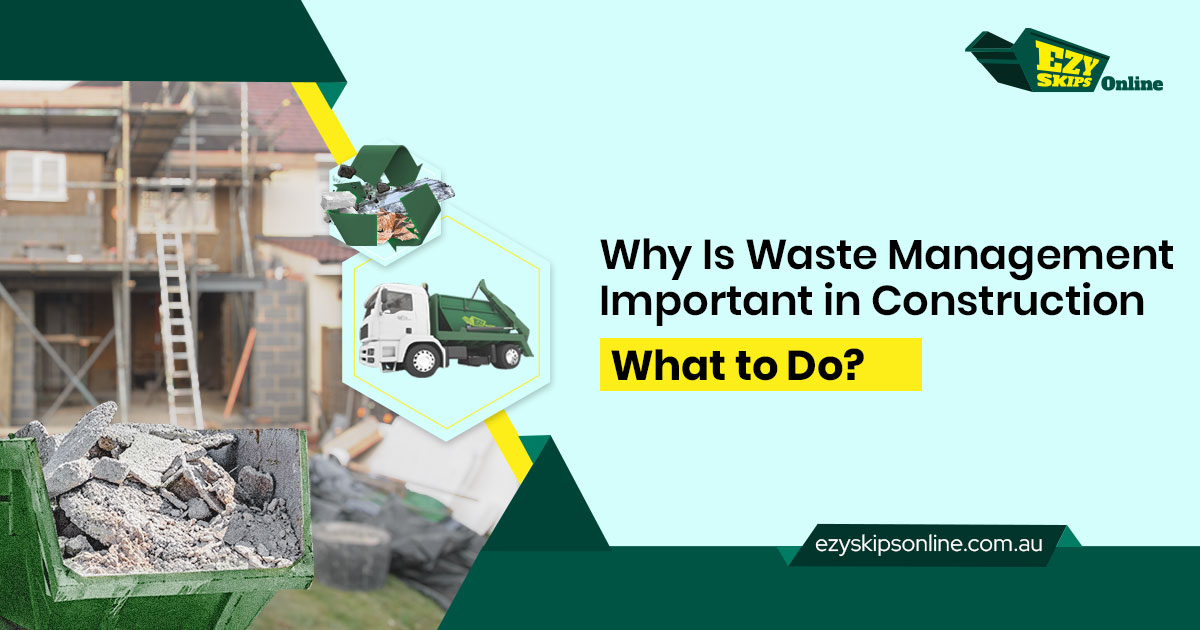
If you’ve ever passed by a construction site, you’ve probably noticed how messy it can get, which might make you wonder: why is waste management important in construction? Well, consider this: construction in Australia produces a staggering 27 million tonnes of waste each year, highlighting the urgent need for better waste-handling practices in the industry.
That’s almost half of all the waste in the country! Let’s talk about why managing this waste is so important and what we can do about it:
Protecting Our Environment
When construction waste isn’t handled properly, it can harm our environment. Things like chemicals and debris can pollute our soil and water, which is bad news for plants, animals, and even us.
By managing waste better, we can help keep our environment clean and healthy.
Saving Space in Landfills
Our landfills are filling up fast. Most of Australia’s landfills could be full by 2025. Construction waste takes up a lot of space because it’s often big and bulky.
If we can reduce the amount of construction waste going to landfills, we can make our existing landfills last longer and avoid needing to create new ones.
Using Resources Wisely
Many things used in construction, like wood, metal, and concrete, can be used again or turned into something new. When we reuse or recycle these materials, we don’t need to take as many new resources from the earth.
This helps preserve our natural resources for the future.
Saving Money
Believe it or not, good waste management can save construction companies money. Getting rid of waste costs money, and buying new materials is expensive.
By reusing and recycling, companies can cut down on these costs. It’s often cheaper to recycle something than to buy it new.
Following the Rules
In Australia, there are rules about how construction companies should handle their waste. Companies need to have plans for managing waste and must recycle a certain amount.
By following these rules, companies avoid getting in trouble and help meet Australia’s goals for reducing waste.
Looking Good to Customers
More and more people care about protecting the environment. Construction companies that handle their waste responsibly look good to potential customers.
It shows they care about more than just building – they care about building responsibly.
Keeping Workers Safe
A clean construction site is a safer construction site. Regularly getting rid of waste helps prevent accidents and makes it easier for workers to do their jobs.
This isn’t just good for safety; it also helps get the job done faster.
Creating New Opportunities
As we focus more on managing waste, new jobs and businesses are popping up. People are finding clever ways to recycle materials and create new products from waste.
This is good for the economy and helps create a more sustainable construction industry.
What to Do with Construction Waste?
Make a Plan
Every construction project should start with a plan for handling waste. This plan should cover how to create less waste, what can be recycled, and how to get rid of things that can’t be reused or recycled.
Recycle and Reuse as Much as Possible
Many construction materials can have a second life. Concrete can be crushed up and used in new projects.
Wood can be reused or turned into fuel. Metals are easy to recycle. By focusing on these practices, we can greatly reduce the amount of waste that ends up in landfills.
Use Pre-made Parts
Using parts that are made in a factory before they reach the construction site can help reduce waste. These pre-made parts are often made more efficiently, with less waste in the process.
Sort Waste on the Site
Having different bins for different types of waste makes recycling much easier. When materials are mixed, it’s harder to recycle them.
Sorting waste on the construction site is a simple step that can make a big difference.
Teach Workers About Waste
Everyone on a construction site needs to understand why waste management is important and how to do it right. Training workers on how to reduce waste, recycle, and dispose of materials properly helps create a culture where everyone does their part.
Work with Recycling Companies
Partnering with local recycling facilities can make the whole process smoother. These companies can often provide advice on the best ways to prepare recycling materials.
Take Buildings Apart Carefully
When renovating or rebuilding, taking a building apart piece by piece (instead of just demolishing it) can help save many materials for reuse or recycling.
Use Recycled Materials in New Projects
Using recycled materials in new construction projects helps create demand for these materials. This supports the recycling industry and reduces the need for new raw materials.
Use Technology to Track Waste
There are now software programs and apps that can help track and manage waste on construction sites. These tools can help identify areas where waste can be reduced and show how well waste reduction efforts are working.
Why It Matters
Managing waste in construction isn’t just about being eco-friendly – it’s smart business. It saves money, follows the rules, and helps build a good reputation.
As Australia aims to use resources more wisely, the construction industry is leading the way by rethinking waste as a valuable resource. This shift in mindset is changing how we build, with services like sand disposal Perth with skip bins online in Western Australia making it easier for builders to responsibly manage and recycle materials that would have once ended up in landfills.
Dealing with construction waste is a big challenge, but it’s leading to a more efficient, sustainable, and profitable industry. If you’re working on a project and need help managing your waste, contact us for sand skip bin services in Perth to make your site cleaner and more environmentally friendly.
But it’s also a big opportunity. By taking action now, we can build a better future – one where our buildings are not only strong and beautiful but also kind to our environment.
Every small step towards better waste management in construction adds up. Whether you’re a construction worker, a company owner, or just someone who cares about our environment, we all have a part to play in building a cleaner, greener future.

